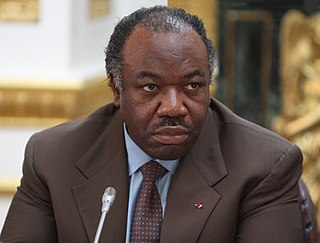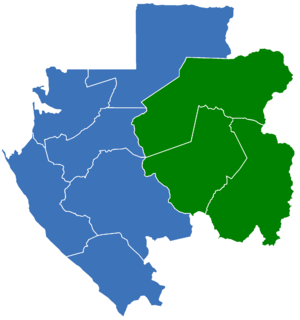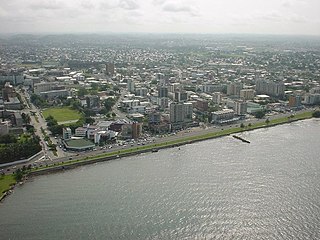Paul Mba Abessole is a Gabonese politician who heads the National Woodcutters' Rally – Rally for Gabon and was a leading opponent of President Omar Bongo during the 1990s. He stood as a presidential candidate twice during the 1990s and also served as Mayor of Libreville, the capital. From 2002 to 2009 he served in the government of Gabon, holding the rank of Deputy Prime Minister for most of that period.

General elections were held in the Central African Republic on March 13, 2005 to elect the President and National Assembly. A second round was held for both elections on May 8, marking the end of the transitional process that began with the seizure of power by François Bozizé in a March 2003 coup, overthrowing President Ange-Félix Patassé. A new constitution was approved in a referendum in December 2004 and took effect the same month.

The Gabonese Progress Party is a political party in Gabon.
Pierre Mamboundou was a Gabonese politician. He was President of the Union of the Gabonese People (UPG), an opposition party in Gabon, from 1989 to 2011.
Augustin Moussavou King is a Gabonese politician and the President of the Gabonese Socialist Party (PSG).

The Union of the Gabonese People is an opposition political party in Gabon. It was led by Pierre Mamboundou until his death in 2011.
Casimir Marie Ange Oyé-Mba is a Gabonese politician. After serving as Governor of the Bank of Central African States (BEAC) from 1978 to 1990, Oyé-Mba was Prime Minister of Gabon from 3 May 1990 to 2 November 1994. Subsequently he remained in the government as Minister of State for Foreign Affairs from 1994 to 1999, Minister of State for Planning from 1999 to 2007, and Minister of State for Mines and Oil from 2007 to 2009.
Didjob Divungi Di Ndinge is a Gabonese politician who was Vice-President of Gabon from 1997 to 2009. He is the President of the Democratic and Republican Alliance (ADERE), a political party. As Vice-President of Gabon, Divungi Di Ndinge exercised presidential powers in an acting capacity from May 2009 to June 2009, while President Omar Bongo Ondimba was hospitalized.

Presidential elections were held in Gabon on 6 December 1998. Incumbent President Omar Bongo Ondimba, in power since 1967, sought a seven-year term against five other candidates. It was Gabon's second multi-party presidential election and, despite low turnout and polling problems, Bongo won the election with 66.88% of the vote.

Local elections were held in Gabon on April 27–30, 2008, with 1,990 municipal and departmental councillors being elected.
André Mba Obame was a Gabonese politician. After serving as an adviser to President Omar Bongo in the 1980s, he was a minister in the government of Gabon from 1990 to 1991 and again from 1997 to 2009; during that time, he was identified with the reformist wing of the ruling Gabonese Democratic Party (PDG). He held the key post of Minister of the Interior from 2006 to 2009 and then briefly served as Minister of the Coordination and Follow-up of Government Action in mid-2009. He was an independent candidate in the 30 August 2009 presidential election and placed third with 25.33% of the vote, according to official results, but he claimed victory and alleged that the PDG candidate, Ali Bongo, won through fraud.
Pierre-André Kombila Koumba is a Gabonese politician, professor, and medical doctor. He was the First Secretary of the National Rally of Woodcutters (RNB), Gabon's main opposition party, from 1990 to 1998; he then led a split from the RNB, establishing the more radical National Rally of Woodcutters - Democrats (RNB-D) in 1998. He was nominated as the RNB-D's candidate for the 1998 presidential election, but received only a small share of the vote. Later, he abandoned his opposition to President Omar Bongo and joined the government, serving as Minister of Technical and Vocational Education from 2006 to 2009 and as Minister of Hydraulic Resources and New Energies in 2009. Following Bongo's death, he rejoined the opposition in mid-2009.
Jean-Boniface Assélé is a Gabonese politician and the President of the Circle of Liberal Reformers (CLR). He served in the government of Gabon from 1975 to 1990 and again from 2004 to 2009. He was also Commander-in-Chief of the National Police Forces from 1970 to 1989 and held the rank of General. Since September 2009, Assélé has been the Fourth Vice-President of the Senate of Gabon.
Jules-Aristide Bourdes-Ogouliguende was a Gabonese politician who was the President of the Congress for Democracy and Justice (CDJ), an opposition party. He served as a minister in the government of Gabon from 1976 to 1990 and was President of the National Assembly from 1990 to 1993; from 1993 until his death in 2018.

Early presidential elections were held in Gabon on 30 August 2009. They took place due to the death of incumbent President Omar Bongo on 8 June, after more than 41 years as the sole president of Gabon. While the constitution stated that interim President Rose Francine Rogombé should organise elections within 30 to 45 days, the Constitutional Court accepted the government's request for a delay due to the circumstances.

Bruno Ben Moubamba is a Gabonese politician. As an opposition leader, he stood as a candidate in the 2009 and 2016 presidential elections in Gabon. He served in the government as Minister of Housing from 2016 to 2017.
Louis-Gaston Mayila is a Gabonese politician. He is the President of the Union for the New Republic (UPRN), a political party.
Jean-Félix Mouloungui is a Gabonese politician who was appointed to the government of Gabon as Minister of Small and Medium-Sized Enterprises in October 2009.

Presidential elections were held in Gabon on 27 August 2016. Incumbent President Ali Bongo Ondimba ran for re-election and was challenged by former Minister of Foreign Affairs Jean Ping. On 31 August, the electoral commission proclaimed Bongo's re-election with a margin of less than two percent. Protests broke out in the capital Libreville after the results were announced.









